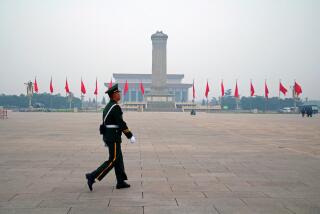Teaching how China works in 5 neat rules
As Tim Clissold’s new book “Chinese Rules” was being prepared for publication, Chinese prosecutors fined British drug maker GlaxoSmithKline $492-million and gave one of its senior executives a suspended jail term.
In a separate case, a Shanghai court convicted a British investigator and his U.S. wife of violating privacy laws and sentenced them to up to two and a half years in prison.
Such criminal dramas aside, China’s competition authorities have recently penalized European and Japanese automotive firms for alleged infractions of the country’s 2008 Anti Monopoly Law. That added to the paranoia of a foreign investment community that increasingly feels itself under siege in the world’s second-largest economy.
In light of these and other events, Clissold’s attempt to encapsulate how China works in five neat rules is well timed. His book, “Chinese Rules: Chinese Rules: Mao’s Dog, Deng’s Cat, and Five Timeless Lessons from the Front Lines in China” is published by Harper.
All are underpinned by his conviction that Chinese business and regulatory behavior, which routinely bewilders outsiders, is in fact logical and fathomable.
You just need to understand your partner or regulator’s problems, priorities, and the unique cultural and historical background that informs them.
The insights Clissold sheds on deal-making in China ultimately stem from an ability – born of years of experience and his fluency in Mandarin – to see any situation from a .local point of view.
So when an investment banker in London rails against a suddenly reluctant Chinese partner, fuming that the latter’s last-minute insistence on changing the terms of an agreed deal “will ruin their reputation in the city,” Clissold knows the Chinese partner could not care less about the city.
Instead, he sets out to uncover what problem the local side has suddenly encountered – in this case a complicated government approval process – and figures out how the foreign investor can help address it. By aligning the two parties’ interests, the deal is saved.
The British entrepreneur and author’s best-selling first book, Mr China, was a classic account of his attempt in the 1990s to invest – and later salvage – a $400 million fund raised by a hotshot Wall Street banker who bought stakes in factories all over the country.
In “Chinese Rules,” fans of Clissold’s first book will find plenty of only-in-China tales from the author’s reincarnation as a carbon credit entrepreneur, on the prowl for qualified Chinese carbon-capture investment projects that can earn his backers lucrative credits to resell to European polluters.
His amusing anecdotes illustrate some of the rules he sets out for foreigners mystified by China, which can come across as a kind of economic chaos that somehow works on a macro level -- yet can be frustrating for individual investors.
Other rules, such as the importance of understanding Chinese government officials’ preoccupation with social stability, are elaborated with sweeping summaries of particular historical episodes and periods.
These interludes leave the reader impatient for more of Clissold’s first-person accounts, where his formidable storytelling skills are on best display. But there are still enough of those to make “Chinese Rules” an entertaining and valuable book. GlaxoSmithKline’s new chairman, and others, should take note.
Tom Mitchell is a Beijing-based reporter for the Financial Times of London, in which this review first appeared.





